| Article Overview:
In the 6th Century B.C. the Greeks came up with a way to govern
without leaders. They formed Parents of Vigilance groups
of no more than 10,000 and voted on what was right for the future of
the Children's Children's Children. Maybe it's time for
Americans to go back to the "well" and remind themselves why a
Vigilance Platform is the key to making the future safe from the Beast
of Terror. |
 VigilanceVoice VigilanceVoice

www.VigilanceVoice.com
Tuesday--November
25, 2003—Ground Zero Plus 804
___________________________________________________________
The Vigilance Platform: What
America Needs To Fight Terrorism
___________________________________________________________
by
Cliff McKenzie
Editor, New York City Combat Correspondent News
|
GROUND ZER0, New York, N.Y.--Nov. 25, 2003--
America is in dire need of a sound political platform that cuts
through party lines, heals the wounds between left and right, closes
the vicious gap between leaders and potential leaders vying for top
positions within our government.
America needs the Vigilance Platform, one
that promotes Courage over Fear, Conviction in place of Intimidation
and advocates Right Actions for the benefit of the Children's
Children's Children instead of selfish Complacency.
This platform isn't new. It goes back to
the 6th Century.
Divisions between people over "what's in it for
me today" blinds societies to what are the best decisions for future
generations. This "Selfish Complacency" tends to rule modern
politics as factions fight to win the support of people who are more
concerned with their needs than the future needs of a nation and a
world struggling to rise out of the primordial ooze of Terrorism.
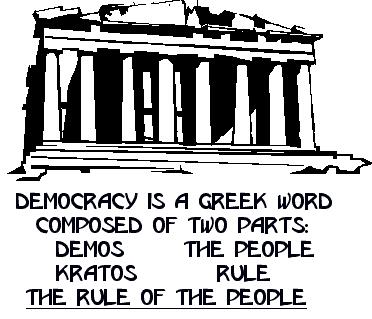
|
|
Democracy goes
back to the ancient Greeks in the 6th Century B.C. |
Democracy, "the rights of the people," isn't
a new concept. It wasn't recently invented. It
goes back to the 6th Century B.C. to the ancient Greeks who pressed
two words together--demos, meaning people and kratein,
meaning rule--to form a system of self-governing where the people
chose the future of their society.
There was something else the Greeks designed when
democracy was born, and that was the city-state. The
Greeks formed these city-states in populations not greater than 10,000
and voting was done by the citizens. There were no
"leaders," in this system. The people voted for what was right
for their society of 10,000.
Later, when the Roman Empire took hold from
509-27 B.C., representative government was formed.
Citizens elected representatives to bring their Voice to the surface.
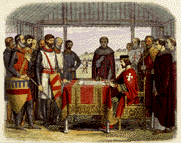 |
|
Democracy
evolved further with the Magna Carta in 1215 |
Democracy evolved further with the Magna Carta in 1215 that created a Parliament. It was enhanced by the
1628 Petition of Rights that denied the King the right to raise taxes
without Parliament's permission, and the Bill of Rights in 1659 that
expanded freedom of speech and attacked cruel and unusual punishment
of citizens.
Modern democracy owes much of its sinew to a
couple of English and French philosophers, John Locke and Jean Jacque
Rousseau. In 1690 English philosopher Locke said in
"Two Treatises" that government's role was to protect the
"natural rights" which included "life, liberty and the ownership of
property."
In 1762, Rousseau put his French spin on the
importance of democracy in The Social Contract.
When France overthrew its King during the French
Revolution, Rousseau's and Locke's footprints helped carve out the
"Declaration of The Rights Of Man," which modified earlier rights
to include the rights to "liberty, property, security and resistance
to oppression."
 |
|
Thomas Paine
was instrumental in promoting "natural rights" |
In concert with these revelations about
self-government was Thomas Paine, who wrote the "Rights of Man,"
and was instrumental in promoting the "natural rights" of all, not
subject to any government. Thomas Jefferson, who
drafted the U.S. Constitution, weaved into the document centuries of
history and experience, as well as the "right of revolt," as stated in
the Declaration of Independence, that allows the rights of the people
to trump any government.
But, to truly examine the role of government, one
must not be seduced into thinking that what exists today is the "best"
or the "most right" form of government. Perhaps the
"best" or "most right" government was the one that launched the
current system--the Greek system that allowed the citizens of
city-states of no more than 10,000 to vote on issues and act as a
community rather than subjects of government.
Vigilance is about this kind of self-government.
Vigilance is not about electing leaders to
guide us through the maze of life, for when one gives over his or her
rights to another, there is always a watering down of those rights, a
whittling of them, a shredding of their power and might as they are
mixed within the potpourri of other people's rights.
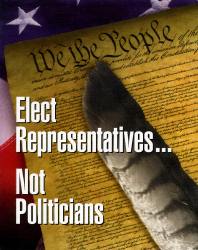 |
|
Vigilance is
not about electing leaders to guide us |
By nature, human beings tend to be
selfish. We are naturally interested in what is best for
us. Survival first seems to rule our instincts, and then,
once we have conquered survival -- i.e. food on the table, roof over our
heads, clothes on our back--if we have any extra time, money or food,
we might just share some of it with others who are in need.
I worked for a man once who had a
simple philosophy that dovetails with this point of view.
He said often: "My kids go skinny last."
Everyone understood what he was
saying. There was no need for long-winded explanations.
However, today, the political issues
facing our country and the world at large aren't about eating, or
shelter, or clothing--the fundamentals of life.
The true political issue we face is the "social
contract" that John Locke and Jean Jacques Rousseau splashed before
our eyes in their effort to make us responsible for far more than our
immediate needs.
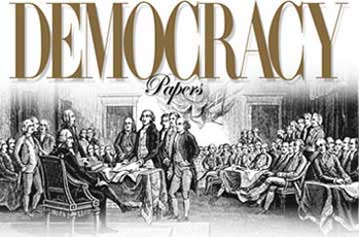
|
|
We have a
contract with the future...for the Children's Children's Children |
The "social contract" is about
selflessness rather than selfishness. It is a
contract not with the present, but with the future. It has
little to do with the "here and now" but everything to do with the
Children and their Children's Children's Children.
In addition, the two
philosophers brought up an issue most politicians like to duck, the
issue of "natural rights." Politicians don't like talking about
"natural rights" because, by their natures, politicians like to
"legislate rights." They like to think that government gives
people rights, issues them down from some lofty highlands.
To accept people have "natural rights" is to deny their power, their
purpose, their righteous belief that people need to be lead.
The ancient Greeks knew
better. The original democracy was about people coming
together in small franchises of less than 10,000 to vote collectively
as a society on issues that impacted their community.
Each retained his or her "natural rights" and couldn't fathom giving
them over to anyone, not even to a "representative." The
rights were pure, undiluted.
America took this tool
when it originally designed its democratic template. It
called for one "representative" per 30,000 population, three times
that of the original Greek formula. In the early 20th Century
the politicians, seeking more power and control, put a cap on
"representative leadership." Fearing the power of
immigrants to have a larger Voice in government, the Congress in 1911
capped the number of representatives to 435.
Today, with a population of 290
million, the U.S. representative government has gone from 1:30,000 to
1:666,666. In comparison, England's House of Commons has
651 members with a population of 59 million creating representation of
1:90,000.
Ironically, the Congressional
support systems--staffers who help manage the offices of the 435
Legislators--have swollen in size to support the "representatives."
In 1930 there were 870 House employees. In 1999, the employees
exceeded 7,200.
So here we are. Our
"government of natural rights" is being managed by a few "leaders" who
try to juggle the "rights" of more than a half-million people (and
it's growing), and rely on a staff of thousands of non-elected, often
very young college students, to manage the needs of a society.
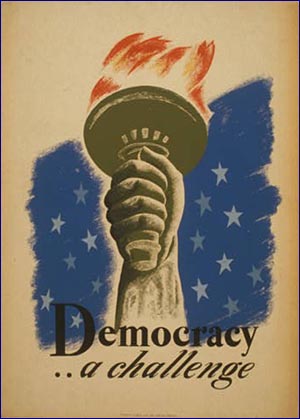
|
|
Democracy is
far from perfect |
Power crams itself into a few heads.
Recently, for example, during the filibuster to block the appointment
of federal judges, politicians read from books to eat up time.
Issues of vital national importance were subjugated to readings from
books such as "Captains and Masters," a signal that perhaps our
leadership is more concerned in showing their power to the opposition
than reflecting on the issues of the day.
All these facts are not intended to
denigrate democracy, or to suggest that American democracy is wrong.
It's not. But, as has been said many times, it is far from
perfect.
What has happened, I believe, over
time is a gradual but dangerous distancing of our "representatives"
from the heartbeat of democracy. The real issue in any
democracy is protecting the future "natural rights" of the children.
If the "social contract" is
valid, it means that society is more important than the individuals
who comprise it. And, this is the tricky part, that the
individual's natural rights are more important than those of
society's.
At first glance, these two seem to
conflict--society vs. individual? But, when one looks at
the two through the eyes of Vigilance, one sees the two as one.
Society is the "parent" and the individual is the "child."
The "parent's" duty or "social
contract" is to protect the rights of the "children." That
means the decisions the parent makes today must be to the benefit of
the "children," and not just the immediate "children," but the
"children's children's children," at the least.
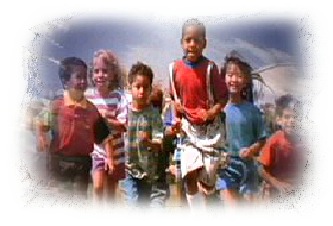
|
|
A child is not
measured by his or her parent's race, color creed, ethnicity or
national origins |
Natural rights
include the rights of all, not the few. American children's
rights are not above the rights of those children in Africa or Iraq or
North Korea or France. A child's rights
supercede all other rights, and that child is not measured by his or
her parent's race, color, creed, ethnicity or national
origins.
Children's rights stand separate from those
of adults for one simple reason--a child cannot chose. A
child is, by definition, pure innocence. A child cannot
change who or what he or she is, while a parent or adult can.
A parent or adult can change his or her name, immigrate to another
land, alter his or her color or physiognomy through science, even
alter his or her sex.
A child can only ride the
wake of the adult, become either a victim of the relationship or a
beneficiary of it. Children become the mirror of
their parents, of the adult world that they are reared within.
Children raised in homes or
societies that breed hatred for or against others have a great chance
of assuming the same demean as their environment. While this
isn't always the case, the odds favor the child being shaped and
sometimes ravaged by what he or she is taught, witnesses or
experiences.
Adults have a duty to a
child that goes far beyond their own beliefs and convictions.
They have the duty to protect the child's "natural rights," to allow
the child to grow and prosper without being victimized by parental
prejudices or bigotries, by teaching the child to chose and think and
become responsible for his or her actions, even those that may be in
opposition to those of the parent.
 |
|
Adults have a
duty to teach Children about the Beast of Terror.... |
This leads us to the real duty of parenthood.
That is to teach the child about he presence of the Beast of Terror
and its counterpart, the Sentinel of Vigilance.
Teaching a child that
there is a Beast of Terror is to teach a child that Fear, Intimidation
and Complacency exist, just as air exists, or the sun rises and sets.
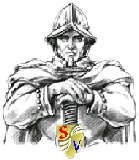 |
|
....and that
the Sentinel of Vigilance can overpower the Terror of the
Beast |
Teaching a child that a Sentinel
of Vigilance exists is to also teach that Courage can replace Fear,
that Conviction can overpower Intimidation and that Right Actions for
the Children's Children's Children is the great goal of overcoming
Social Complacency.
In politics, as we know
it today, adults use Fear, Intimidation and Complacency to seek power
over others. Assaults on one another for "abusing" their
positions of leadership is the soup of the day.
Bitter attacks of one political would-be against another in or out of
office is the message the child hears. It ends up
that people vote for the "lesser of two evils," for the "best of the
worst."
The Vigilance Party, or
Vigilance Platform, denies the right of the political pundit to use
attack as weapon of attaining power. If power is to be
sought, it must be won not through hurling invectives or trying to
cripple an opponent by advertising the flaws and cracks of his or her
character---but by promoting programs and actions that benefit future
generations.
The Vigilance Platform talks
only in terms of how issues being faced today will have positive
impacts on generations three fold from now.
Take the most current issue:
The War In Iraq.
Where is the Vigilance
Rhetoric?
It is buried, suffocating in
diatribes between the Administration on one hand seeking to defend its
actions, and political wolves seeking to attack the Administration's
efforts to rebuild Iraq.
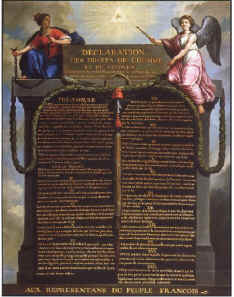
|
|
The above
document reminds us we have a duty to protect children's rights |
History reminds us that the "natural rights"
of citizens is the key to democracy. The "Declaration
of The Rights Of Man," reminds us we have a duty to protect the
children's rights to "liberty, property, security and resistance to
oppression."
We speak about bringing
"freedom" and "liberty" to Iraq, and we promote the importance of that
"freedom" and "liberty" to the people of Iraq, but, we forget to talk
about the "social contract," and that we adhere to that "contract"
because we are making decisions three generations from now, for the
Children's Children's Children.
We don't hear the words:
"Children's Children's Children" being bantered about by politicians,
arguing for what is right for Iraq's future. Instead, we
hear arguments about putting Iraqi's in charge of their country and
then leaving, as though the current generation that was brought up
under tyranny and oppression can suddenly shift gears in a blink and
embrace democracy and liberty. With more than half
the population of Iraq under the age of 20, and, with Saddam Hussein
ruling for more than 23 years, the children have been spoon fed
Terrorism and the parents Complacent to it.
It's not unlike Americans
becoming Complacent to living under the tyranny and oppression of a
government of 435 Legislators. For more than 90
years, Americans have watched their government grow more detached from
the issues that affect daily life and more elevated upon pedestals
that distance them from the grass roots.
Tyranny and oppression are the fuels of
Terrorism, and they do not always come in the forms of bombs and
bullets, or suicide attacks, or blowing up Blackhawk helicopters.
Sometimes these fuels ignite spontaneously, through Complacency.
 |
|
Vigilance is
the antidote for Fear, Intimidation and Complacency in out society |
Vigilance is the antidote to
allowing Fear, Intimidation and Complacency to fester within our
society. It demands us to think about Iraq and our own
welfare through the eyes of a Sentinel of Vigilance, a Parent or
Grandparent of Vigilance or a Loved One of Vigilance.
If we look long and hard, we
see that our duty is to stand up for what is right in Iraq.
It means we need to throw the words of the French back at them.
We need to open Rousseau's book, "Declaration of The Rights Of
Man," and remind the French that the words "liberty, property,
security and resistance to oppression" applies to Iraq just as it did
to the French Revolution.
Did America have a right
to invade Iraq? Does it have a right to install democracy and
liberty in a land where politics might suggest we should turn and run
fast before we get further bogged down by Terrorism's Fear,
Intimidation and Complacency?
If you are a subscriber
to Vigilance, if you are a member of the Vigilance Platform
you agree with America and its efforts in Iraq.
If we believe in the
"social contract" and cherish the "natural rights" of our children and
the "natural rights" of all children, if we believe that all people
have the right to "liberty, property, security and resistance to
oppression," then we cannot turn our heads and look the other way to
the future of Iraq, or any nation that seeks to quash its future
generational rights.
It also means we need to step
back from our own selfish opinions about "who and what is right," and
shed our political shrouds and personal opinions shaped and formed by
our own personal experiences and beliefs---and take a hard, long look
at the future of the Children's Children's Children.
If we can divorce ourselves
from our selfish viewpoints, might we possibly be able to see
selflessness for the future of the children of Iraq as well as our
own? Might we suddenly realize that we need to support the
efforts to bring the "social contract" of democracy to Iraq no matter
what the costs?
And, might we also take a long
second look at our form of representative government and question
whether we are being represented properly or improperly?
 |
And, if we realize that maybe the Greeks had something we've
lost, maybe we should all take or re-take the Pledge of Vigilance and
become a Sentinel or Parent or Grandparent of Vigilance so that the
Beast of Terror doesn't sneak up when we're not looking and eat what
little natural rights are left on our Thanksgiving table.
Nov.
24--Mickey
Mouse
Reeling
Under
Terrorism
Of
Age
©2001
-
2004,
VigilanceVoice.com,
All
rights
reserved
-
a
((HYYPE))
design
|
|
|